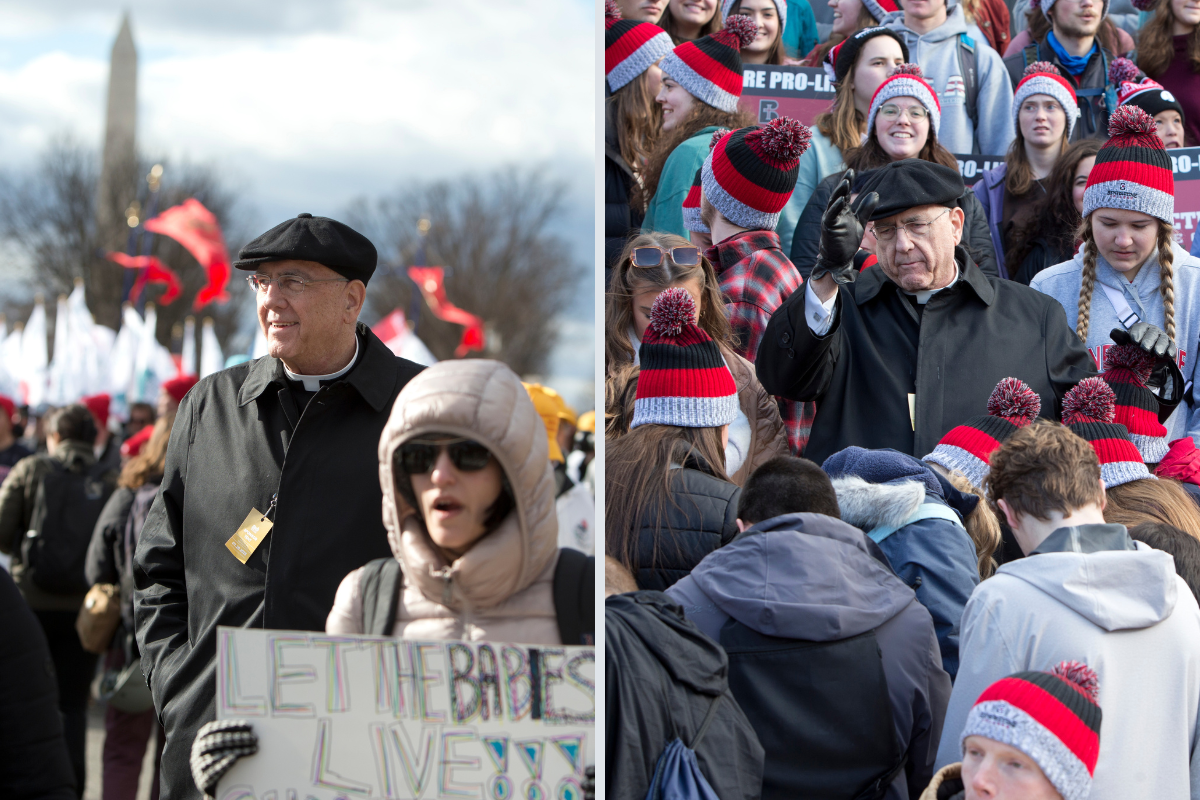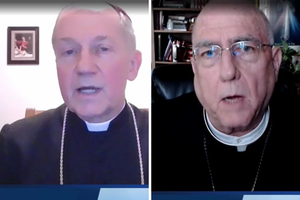Archbishop Naumann Talks Motherhood, the Right to Life and the Power of Our Individual Witness
Kansas City shepherd says, ‘My mother was the most influential teacher of the faith.’

When the U.S. Supreme Court legalized abortion on demand in its Roe v. Wade decision in 1973, Joseph Naumann was a seminarian. Last year, when the court overturned Roe in its Dobbs v. Jackson Women’s Health Organization decision, he was the archbishop of Kansas City, Kansas — and the former chairman of the U.S. Conference of Catholic Bishops’ Committee on Pro-Life Activities. Archbishop Joseph Naumann spoke this week with the Register about the Dobbs decision, the future of the pro-life movement, and the vital importance of mothers and fathers, something that needs to be celebrated every day of the year, not just on Mother’s Day and Father’s Day.
How did your own upbringing influence you in the arena of life issues?
My mother was the most influential teacher of the faith. She lived till 97. She had a long life, in many ways a good life, but not an easy life. I’m so grateful I grew up with her example and witness. I got a Christmas card this past Christmas from a man who grew up in the same part of South St. Louis I did. He went to school at the parish school where I went and where my mom taught. Inside the card, he had a card she had given to him in kindergarten. It was just a reminder to me of what an impact her life had.
Jesus doesn’t promise easy, but he does promise that if we follow him, he’ll be with us, and we’ll never be alone; we’ll have reason for peace and joy.
I think my mother lived that witness. [She had a] friendship with Jesus; she had a great devotion to Mary. Those relationships with the Blessed Mother and with Our Lord, they can give purpose, meaning, resources for peace and joy in our loves. I hope my life as a priest and a bishop in some way has helped communicate what she taught me by the very example of her life.
It’s that time of year: This month we celebrate Mother’s Day, and next month we celebrate Father’s Day. What would you like to say to the parents reading this?
I thank them for their vocation. There’s nothing more important in our culture and society than the family and parenthood. I think marriage is the foundation of that, but many are growing up out there in single-parent families, as I did [his own birth occurred after the murder of his father — putting his mother in the challenging position of raising him and his older brother on her own]. I think our single parents are real witnesses of heroic love. They continue to pour their lives out for the good of their family, the children.
It’s sad that motherhood has been denigrated by our society and looked down upon in some ways; it is the most important vocation, motherhood and fatherhood. That’s what keeps humanity going, and that’s where the next generations are best formed: in loving homes and loving families. I just salute all parents who lay down their lives for their children.
What was your reaction when you learned the Supreme Court had overturned Roe v. Wade?
It’s kind of a complicated emotion. I thought we had a legitimate chance of the court doing this, but we’ve had other times when we thought the court was really close and we didn’t make it.
I was surprised, and I was happy: This was something that we had been dreaming about and working towards for decades. There was a lot of elation, but also concern: We got what we were hoping for, returning it [the decision about legal abortion] to the states, but now we have the battle in every state. Are we ready for it?
While the pro-life movement has been celebrating the decision, it is not the end of abortion in our country — yet — but the beginning of a new phase of the movement.
I think it also revealed, while we’ve done a lot in terms of our pro-life education, there has been an effect of 50 years of this being the public policy in this country. The sad thing to me was it became apparent that among a large number of Americans, they don’t think we can survive without the ability to kill our own children. That’s what it comes down to. This is the primordial right [in our culture]: to be able to take the lives of our own children.
What can pro-life people say or do to help others understand the truth about the sanctity of human life?
We have 50 years of evidence of some of the things that were promised back in 1973, that abortion was going to solve so many issues: We have the evidence that this hasn’t worked and isn’t working.
Some people will be won by arguments and facts, but the witness has to be of our own lives, and where do we find meaning and joy that’s enduring? It’s not necessarily doing the easy thing, or the pleasurable thing; it is in faithful, committed love, following the way of Jesus, willingness to sacrifice for the good of others. It’s committed love that’s really essential.
We have so many of our children growing up in homes without their biological father — it’s a cultural disaster, but we haven’t been willing to face that. The witness of joyful marriages and joyful families, and young people striving to have that virtuous relationship — it’s that witness and example that can win people over more than the facts and arguments.
I think that we just have to be witnesses of joy and hope in the culture. Strong marriages and families have an evangelizing component to them.
There are many people who believe in the sanctity of human life but are hesitant to take action. What suggestions do you have for those people?
I think we each have to pray about that and ask, “Lord, what is it you want me to do to help build this culture of life? … How are you calling me not to be part of the throwaway culture?”
One of the ways I’m so glad the bishops’ conference embraced this is Walking With Moms in Need, surrounding those who are in unexpected pregnancies with love and support. It’s sad to see the way that pregnancy-resource centers have been portrayed by the opposition, but I think they’re really the antidote in so many ways. We see the fruit of their efforts.
This lie that pro-life people only care until the baby is born — the crisis-pregnancy centers I’m aware of walk with women for years after the baby is born. The goal is for the mother and the baby to thrive, for the family to thrive. The politics can get very divisive, but I think this is something we can all get behind: helping those who are in difficult pregnancies choose life and make good choices the baby and the mother can both live with.

It’s such an important job, and it’s such a big one.
It’s easy to get discouraged, but I remember Mother Teresa’s [answer to the] question about “How did she start out to serve these millions?”: “I just started out with the one; I cared for this one.”
The culture is made up of the individual decisions of people.
I think we change culture one person at a time and society one person at a time. Our opponents did this, and they did it with lies and misinformation.
I think we have to continue to communicate the truth — and always to do it with love. We have the better answers for people.















